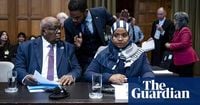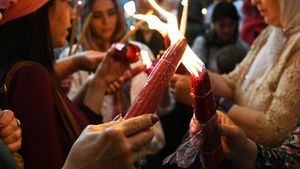In a significant legal battle unfolding at the International Court of Justice (ICJ), the United Arab Emirates (UAE) stands accused of complicity in genocide through its alleged support for the Rapid Support Forces (RSF) militia in Sudan's ongoing civil war. The case, initiated by Sudan, has attracted international attention as it raises critical questions about the UAE's role in the conflict and its implications for international arms regulations.
Sudan's acting justice minister, Muawia Osman, presented the country's case to the ICJ in The Hague, stating that the "ongoing genocide would not be possible without the complicity of the UAE, including the shipment of arms to the RSF." This assertion underlines the gravity of the allegations, as Sudan seeks not only to halt the UAE's support for the RSF but also to secure reparations for victims of the conflict.
In a strong rebuttal, Reem Ketait, a senior official from the UAE's foreign ministry, dismissed Sudan's claims as "at best misleading and at worst pure fabrications." She emphasized that the notion of the UAE being a driving force behind the conflict is unfounded, arguing that the case represents Sudan's misuse of international institutions to attack the UAE.
The legal proceedings are complicated by a reservation the UAE made upon signing the genocide convention in 2005, which asserts that disputes regarding its compliance with the convention cannot be adjudicated by the ICJ. This reservation may serve as a crucial point in the UAE's defense, possibly limiting the court's ability to rule on the allegations.
The conflict in Sudan erupted in mid-April 2023, following long-standing tensions between the military and the RSF. Both factions have been accused of committing serious human rights abuses during the war, which has resulted in widespread suffering and displacement.
Recent diplomatic efforts to establish a ceasefire have faltered, as evidenced by a British-led initiative that collapsed on April 15, 2025, after Arab states declined to sign a joint communiqué following a conference in London. Analysts suggest that the UAE's involvement in Sudan is driven by a desire to gain political influence at the expense of regional rival Saudi Arabia, exploit Sudan's natural resources, and counter the spread of political Islam, which the UAE views as a security threat.
As the case progresses, it is being expedited due to the urgent nature of the allegations, particularly concerning the RSF's treatment of the Masalit people in Darfur. Professor Eirik Bjorge, representing Sudan, highlighted the serious evidence suggesting that the UAE is failing to prevent genocide and is complicit in the ongoing atrocities.
Bjorge referenced a UN panel of experts that assessed allegations of cargo planes from the UAE transporting weapons to the RSF as credible. He also pointed to intelligence reports indicating that a UAE-built field hospital near an airport in eastern Chad was a crucial support hub for the RSF.
The situation is further complicated by recent developments in U.S. foreign policy. In January 2025, the Biden administration imposed sanctions on seven RSF-owned companies in the UAE, coinciding with a declaration that RSF rebels had committed genocide. The UAE, however, contends that these companies do not hold active business licenses and are not currently operating within its borders.
Sudan's legal team has also cited research from the Yale Humanitarian Research Lab, which identified four Chinese-produced 155mm howitzer artillery guns that were reportedly involved in a bombardment of the Zamzam camp in December 2024. This evidence suggests a direct link between the UAE's arms purchases and the conflict's escalation.
In response, Alison Macdonald KC, representing the UAE, characterized the evidence presented by Sudan as "thin, recycled, or entirely self-serving." She asserted that the upcoming UN panel of experts report would refute Sudan's allegations, contingent on the panel's ability to ascertain the content of cargo shipments from the UAE to Chad.
The impending ICJ ruling carries significant implications for the UAE, which has invested heavily in maintaining a positive international image. Should the court find that the UAE is indeed complicit in genocide, it would represent a severe blow to its reputation on the global stage.
As the situation develops, the ICJ's decision will likely impact not only the UAE's foreign relations but also the broader dynamics of international arms trade and accountability for human rights violations. The case serves as a stark reminder of the complexities surrounding arms exports and the responsibilities of nations in preventing atrocities.




